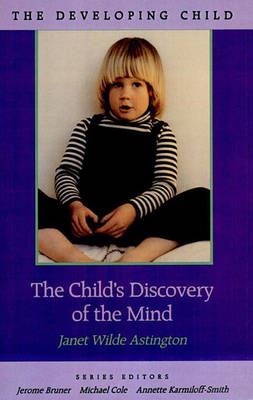
- Retrait gratuit dans votre magasin Club
- 7.000.000 titres dans notre catalogue
- Payer en toute sécurité
- Toujours un magasin près de chez vous
- Retrait gratuit dans votre magasin Club
- 7.000.0000 titres dans notre catalogue
- Payer en toute sécurité
- Toujours un magasin près de chez vous
Description
Three-year old Emily greets her grandfather at the front door: "We're having a surprise party for your birthday! And it's a secret!" We may smile at incidents like these, but they illustrate the beginning of an important transition in children's lives--their development of a "theory of mind." Emily certainly has some sense of her grandfather's feelings, but she clearly doesn't understand much about what he knows, and surprises--like secrets, tricks, and ties all depend on understanding and manipulating what others think and know. Jean Piaget investigated children's discovery of the mind in the 1920s and concluded that they had little understanding before the age of six. But over the last twenty years, researchers have begun to challenge his methods and revise his conclusions. In The Child's Discovery of the Mind, Janet Astington surveys this lively area of research in developmental psychology. Sometime between the ages of two and five, children begin to have insights into their own mental life and those of others. They begin to understand mental representation--that there is a difference between thoughts in the mind and things in the world, between thinking about eating a cookie and eating a cookie. This breakthrough reflects their emerging capacity to infer other people's thoughts, wants, feelings, and perceptions from words and actions. They come to understand why people act the way they do and can predict how they will act in the future, so that by the age of five, they are knowing participants in social interaction. Astington highlights how crucial children's discovery of the mind is in their social and intellectual development by including a chapter on autistic children, who fail to make this breakthrough. "Mind" is a cultural construct that children discover as they acquire the language and social practices of their culture, enabling them to make sense of the world. Astington provides a valuable overview of current research and of the consequences of this discovery for intellectual and social development.
Spécifications
Parties prenantes
- Auteur(s) :
- Editeur:
Contenu
- Nombre de pages :
- 240
- Langue:
- Anglais
- Collection :
- Tome:
- n° 31
Caractéristiques
- EAN:
- 9780674116429
- Date de parution :
- 10-01-94
- Format:
- Livre broché
- Format numérique:
- Trade paperback (VS)
- Dimensions :
- 138 mm x 209 mm
- Poids :
- 290 g

Les avis
Nous publions uniquement les avis qui respectent les conditions requises. Consultez nos conditions pour les avis.






